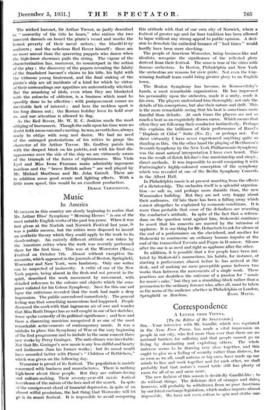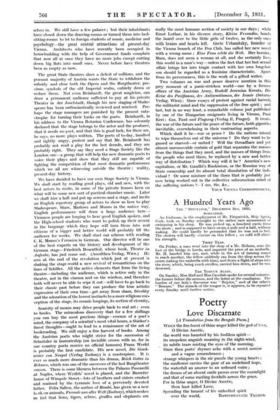Correspondence
A LETTER FROM VIENNA.
[To the Editor of the SPECTATOR.] Sia,—Your interview with Mr. Gandhi, which was reprinted in the Neuc lereu Presse, has made a vital impression on people in our city, who feel more than ever that there arc no national barriers for suffering and that people cannot go on living by dominating and exploiting others. The whole universe seems to be drawing very close together, and this ought to give us a feeling -of security rather than distress, for as soon as we all, small nations or big ones, have made up our minds to live and work together and for each other, we shall probably find that nature's round table still has plenty of room for all of us and some more.
The new fashion of this season is decidedly Gandhi-like : to do without things. The delicious diet of oranges and dates, however, will probably be withdrawn from us poor Austrians by our latest exchange legislation, which makes imports almost impossible. We have not even cotton to spin and clothe our-
selves in. We still have a few palaces ; but their inhabitants have closed down the drawing-rooms or turned them into bed- sitting-rooms to let to foreign students of music, medicine and psychology—the great central attractions of present-day Vienna. Architects who have recently been occupied in housebuilding with the help of Government funds complain that now all at once they have no more jobs except cutting down big flats into small ones. Never before have theatres been as empty as now.
The great State theatres show a deficit of millions, and the peasant majority of Austria wants the State tO.ivithdraw the
subsidy and close both the Opera and the Burgtheater, pre- cious symbols of the old Imperial realm, entirely down or reduce them. Not even Reinhardt, the great magician, can draw a permanent audience sufficient to pay at his private Theater in der Josefstadt, though his new staging of Shake- speare has been enthusiastically reviewed and received. Per- haps the stage managers are punished by the present cata- strophe for turning their backs on the poets. Reinhardt, in his address to the Vienna Rotarian Conference, has solemnly declared that the stage belongs to the actor and the producer, that it needs no poet, and that this is good luck, for there are, he says, no more plays written. The poets of to-day, insulted and rightly angry, protest and say that Mr. Reinhardt has
probably not read a play for the last. decade, and they are probably right. They say they need a Stage Society like the
London one—a group that will help the new dramatic poets to voice their plays and show that they still are capable of fighting the competition of that most dramatic performance which we all are witnessing outside the theatre : reality, present-day history.
We have decided to have our own Stage Society in Vienna. We shall start by reading good plays, old and new, with the best actors to recite, in some of the private houses keen on what will be some new.sort of poetical chamber music. Later we shall hire a hall and put up screens and a stage, and invite an English repertory group of actors to show us how to play Shakespeare, Shaw, Marlowe and Munro in the native way. English performances will draw a large audience here— Viennese people are longing to hear good English spoken, and the High-school students who want to polish up their accent in the language which they hope will turn them into real citizens of a bigger and better world will probably fill the audience for weeks. We shall start our scheme with reading C. K. Munro's Veronica in German. Our director will be one of the best experts on the history and development of the German stage—Friedrich Rosenthal, whose book, Theater in Aufruhr, has just come out. (Amalthea-Verlag, Wien.) He sees at the end of the revolution which just at present is shaking the stage-world a new revival of romanticism on the lines of Schiller. All the active elements that form the living theatre—including the audience, which is active only in the theatre, not in the cinema and on the wireless, and therefore both will never be able to wipe it out—will have to go back to their classic past before they can produce the true artistic expression of their own time—get away from sham, frivolity and the adoration of the lowest instincts to a more religious con- ception of the stage, its cosmic longings, its section of eternity.
Scarcity of means may drive people back to real art ; even to books. The miraculous discovery that for a few shillings you can buy the most precious things—essence of a poet's mind, the company of a scientist's most vital hours, a thinker's finest thoughts—ought to lead to a renaissance of the art of bookreading. We still enjoy a fine harvest of books. Among the Austrian poets who might strive for the succession of Schnitzler in laureateship (an invisible crown with us, for in our country poets receive no official honours) Franz Werfel is probably the first candidate.. His new novel, Die Gesch- wister von Neapel (Verlag Zsolnay) is a masterpiece. It is ever so much more dramatic than his drama, Reich Gottes in Mullen, which was one of the successes of the last Burgtheater reason. There is some likeness between the Palazzo Pascarelli at Naples, where Werfels' novel is placed, and the Barretts' house of Wimpole Street—lots of brothers and sisters crushed and maimed by the tyrannic love of a perversely devoted father. Felix Salten, the author of Banthi, has given us a new bLok on animals, Freunde aus alter Welt (Zsolnay), which makes us feel that lions; tigers, zebras, giraffes and elephants are
really the most humane section of society in our days ; while Ernst Lothar, in his divorce story, Kleine Fr eundin, hands the laurel over to the little girls of twelve, as the only ones with brains and hearts left. Grete Urbanitzky, founder of the Vienna branch of the Pen Club, has called her .new novel with a wrong name : Eine Frau erlcbt die Welt. Her heroine, Mara, does not seem a woman at all, and she certainly lives
this world in a man's way—unless the fact that her last sexual affair brings her into tragic contact with her own long-lost son should be regarded as a feminine characteristic. Apart from its perverseness, this is the work of a gifted writer,
Two volumes on war and peace deserve mention in this grey moment of a panic-stricken world—one by a former officer of the Austrian Army, Rudolf Jeremias Kreutz, Die Krise des Pazifismus, des Antisemitismus, der Ironic (Saturn. • Verlag, Wien) ; three essays of protest against racial hatred; the militarist mind and the suppression of the free spirit ; and last, but in no way least, a remarkable volume just published by one of the Hungarian emigrants living in Vienna, Paul Keri : Gas, Tank and Flugzeug (Verlag E. Prager): It treats the war of the future and the peace of the future, both gigantic; inevitable, overwhelming in their contrasting aspects.
Which shall it be—war or peace ? Do the nations intend to wipe themselves out of the universe ? Do they want to be gassed or starved—or united ? Will the threadbare and yet almost unremovable curtain of gold that separates the masses from the things that they need, and the masses of things from the people who need them, be replaced by a new and better way of distribution ? Which way will it be ? America's new capitalism, or Mr. Gandhi's Ruskinism, or the Russian way of State ownership and its almost total dissolution of the indi- vidual ? Or some mixture of the three that is probably just • now being worked out in the collective subconscious mind of the suffering nations ?—I ain, Sir, &c., Youa VIENNA: CORRESPONDENT.











































 Previous page
Previous page